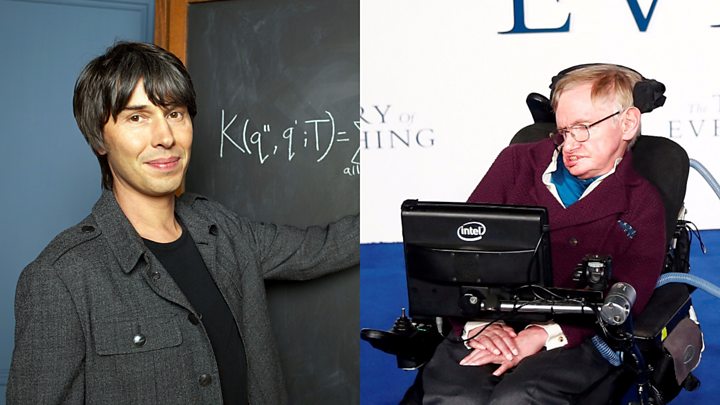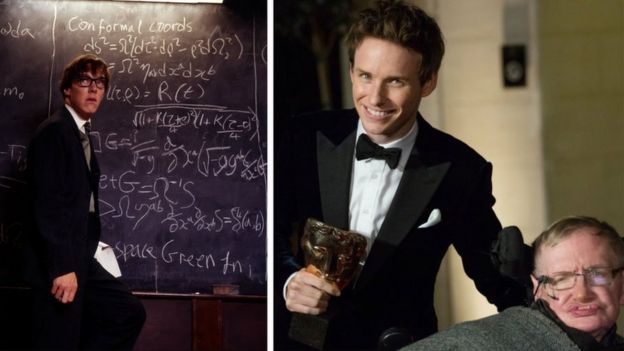Stephen Hawking: Visionary physicist dies aged 76
World renowned physicist Stephen Hawking has died at the age of 76.
He died peacefully at his home in Cambridge in the early hours of Wednesday, his family said.
The British scientist was famed for his work with black holes and relativity, and wrote several popular science books including A Brief History of Time.
At the age of 22 Prof Hawking was given only a few years to live after being diagnosed with a rare form of motor neurone disease.
The illness left him in a wheelchair and largely unable to speak except through a voice synthesiser.
In a statement his children, Lucy, Robert and Tim, said: “We are deeply saddened that our beloved father passed away today.
“He was a great scientist and an extraordinary man whose work and legacy will live on for many years.”
They praised his “courage and persistence” and said his “brilliance and humour” inspired people across the world.
“He once said, ‘It would not be much of a universe if it wasn’t home to the people you love.’ We will miss him forever.”
A book of condolence has been opened at Gonville and Caius College in Cambridge, where Prof Hawking was a fellow.

Prof Hawking was the first to set out a theory of cosmology as a union of relativity and quantum mechanics.
He also discovered that black holes leak energy and fade to nothing – a phenomenon that would later become known as Hawking radiation.
Through his work with mathematician Sir Roger Penrose he demonstrated that Einstein’s general theory of relativity implies space and time would have a beginning in the Big Bang and an end in black holes.
The scientist gained popularity outside the academic world and appeared in several TV shows including The Simpsons, Red Dwarf and The Big Bang Theory.

He was portrayed in both TV and film – recently by Oscar winner Eddie Redmayne in The Theory of Everything, which charted his rise to fame and relationship with his first wife, Jane.
The actor paid tribute to him, saying: “We have lost a truly beautiful mind, an astonishing scientist and the funniest man I have ever had the pleasure to meet.”
Benedict Cumberbatch, who played Prof Hawking in a BBC drama, said he was “a true inspiration for me and for millions around the world”.
 Image copyrightBBC/PA
Image copyrightBBC/PAHis most famous book – A Brief History of Time – has now shot to the top of the Amazon Best Sellers list.
The Motor Neurone Disease Association, of which Prof Hawking had been a patron since 2008, reported that its website had crashed because of an influx of donations to the charity.

Factfile: Stephen Hawking
- Born 8 January 1942 in Oxford, England
- Earned place at Oxford University to read natural science in 1959, before studying for his PhD at Cambridge
- By 1963, was diagnosed with motor neurone disease and given two years to live
- Outlined his theory that black holes emit “Hawking radiation” in 1974
- In 1979, he became the Lucasian Professor of Mathematics at Cambridge – a post once held by Sir Isaac Newton
- Published his book A Brief History of Time in 1988, which has sold more than 10 million copies
- In the late 1990s, he was reportedly offered a knighthood, but 10 years later revealed he had turned it down over issues with the government’s funding for science

Tributes have poured in for Prof Hawking since the announcement of his death.
Prof Lord Martin Rees, the Astronomer Royal, who was at university with Prof Hawking when he was diagnosed, said his friend had “amazing willpower and determination”.
- Listen: Stephen Hawking on Desert Island Discs
- Watch: Stephen Hawking’s greatest wish
- Listen: Stephen Hawking Reith Lectures
Prime Minister Theresa May called him a “brilliant and extraordinary mind” and “one of the great scientists of his generation”.
Labour leader Jeremy Corbyn praised the scientist for his “determination to explain the mysteries of the cosmos” and his “burning passion to protect our National Health Service.”

Sir Tim Berners-Lee, inventor of the web, said: “We have lost a colossal mind and a wonderful spirit. Rest in peace, Stephen Hawking,” he said.
The vice chancellor of the University of Cambridge – where Prof Hawking had studied and worked – Professor Stephen Toope, said he was a “unique individual” who would be remembered with “warmth and affection”.
Prof James Hartle, who worked with him to create the Hartle-Hawking wavefunction to explain the Big Bang, said Prof Hawking had a “unique” ability to “see through all the clutter in physics” and get to the point.
He told BBC Radio Four’s Today programme: “My memory of him would be… first our work together as scientists and, second, as a human being whose whole story is a triumph over adversity [and] who inspired a lot of people, including me.”

The comedian and presenter of the BBC’s Stargazing Live Dara O’Briain said the scientist had an “immeasurable life” and “one of the few people I would call a hero of mine”.
Theoretical physicist, professor Jim Al-Khalili, from Surrey University said Prof Hawking had a tremendous sense of humour.
He told BBC Radio Surrey: “He was a fun loving guy. Inside that shell, inside that body that was paralysed, was someone who was full of vigour, full of passion for life.”

Hawking’s discoveries
- With the Oxford mathematician Roger Penrose, he showed that if there was a Big Bang, it must have started from an infinitely small point – a singularity
- Black holes radiate energy known as Hawking radiation, while gradually losing mass. This is due to quantum effects near the edge of the black hole, a region called the event horizon
- He predicted the existence of mini-black holes at the time of the Big Bang. These black holes would have shed mass until they vanished, potentially ending their lives in an explosion that would release vast amounts of energy
- In the 1970s, Hawking considered whether the particles and light that enter a black hole were ultimately destroyed if the black hole evaporated. Hawking initially thought that this “information” was lost from the Universe. But the US physicist Leonard Susskind disagreed. These ideas became known as the information paradox. In 2004, Hawking conceded that the information must be conserved

British astronaut Tim Peake said Prof Hawking “inspired generations to look beyond our own blue planet and expand our understanding of the universe”.
Gian Giudice, head of theoretical physics at the European nuclear research laboratory CERN, said Prof Hawking had a “great impact” on the centre’s research, adding: “A giant of our field has left us, but his immortal contributions will remain forever.”

Apple’s co-founder Steve Wozniak said: “Stephen Hawking’s integrity and scientific dedication placed him above pure brilliance,”
 Image copyrightAFP/GETTY IMAGES
Image copyrightAFP/GETTY IMAGESIn his 2013 memoir he described how he felt when first diagnosed with motor neurone disease.
“I felt it was very unfair – why should this happen to me,” he wrote.
“At the time, I thought my life was over and that I would never realise the potential I felt I had. But now, 50 years later, I can be quietly satisfied with my life.”
Speaking to the BBC in 2002, his mother, Isobelle, described him as a “very normal young man”.
She said: “He liked parties. He liked pretty girls – only pretty ones. He liked adventure and he did, to some extent, like work.”












